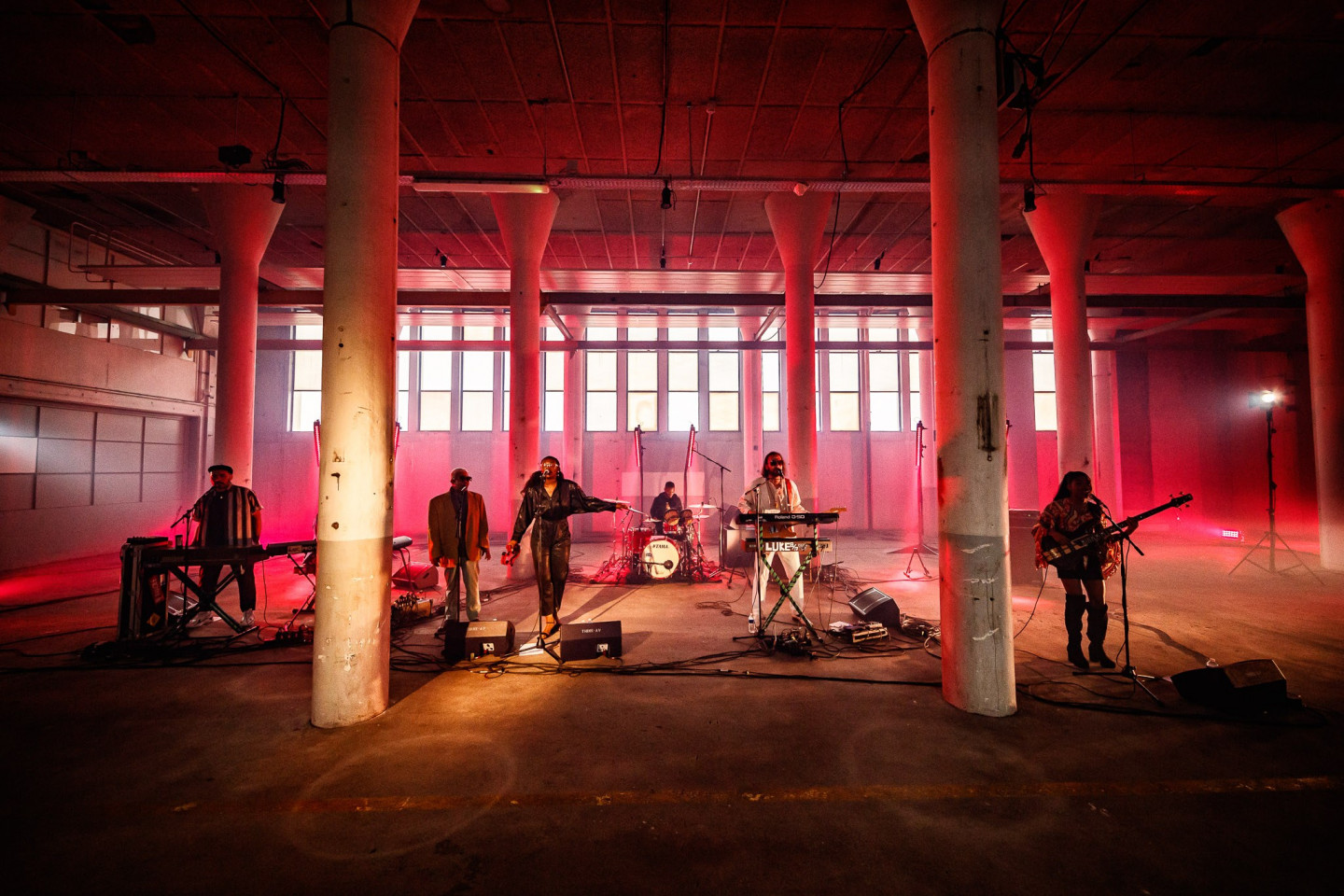The magnetic sound of Arp Frique is flushed with electric colour and warm, pulsating beats. Retro-futurism meets seriously slapping basslines, conjuring 1970s disco danceability.
Words by Hannah Pezzack
At the helm is Niels Nieuburg, who orchestrates collaborations with some of the best-known and loved veterans of the afro-beat, funk and soul canon. Released by Rush Hour, his 2018 debut The Colourful World of Arp Frique, featured the likes of Cape Verdean singer Americo Brito, Brazillian funkster Ed Motta and the legendary Orlando Julius. On the EP Minina Bem Li and forthcoming 2021 album The Seed, Arp once again joined forces with Brito, as well as with Dutch-Ghanian vocalist and Afro-pop musician Mariseya. The pair gave a sneak-preview into their artistic process and shared passion for making music that knows no bounds.
Hi Arp Frique and Mariseya. I just wanted to thank you for brightening up my lockdown with your wonderfully vibrant music. What have you been up to lately that’s been keeping you going?
Arp Frique: At the moment I’m working on a movie that will be released with The Seed, our upcoming album for 2021. It’s a mixture of the band on the road, filmed with my old VHS camera. The movie is a mix of us travelling, touring and performing, as well as psychedelic-fiction, with some autobiographical elements. Mainly around me, Mariseya and Americo Brito.
Sounds reminiscent of Magical Mystery Tour by The Beatles?
Arp Frique: Perhaps not so much that one. More inspired by the documentaries of Herman Brood, who is in my opinion the only true Dutch rockstar, and also the Sun Ra movies as well as the surreal-fantasy film The Holy Mountain (1973). I have an obsession with things from the past. I guess that’s kind of obvious! From our wardrobe to instrumentation, stage design… anything! I’m a big fan of the 1950s, 60s, 70s, 80s.
Mariseya, your solo music has a much more contemporary feel, kind of R&B or pop-orientated. Do you bridge the gap between the past and the present?
Mariseya: I just like to mix it up! My taste is super broad; I love the 1970s, all the way up to our present moment, and the 1990s especially. In the future, in my own music, I’d like to implement some more retro elements.
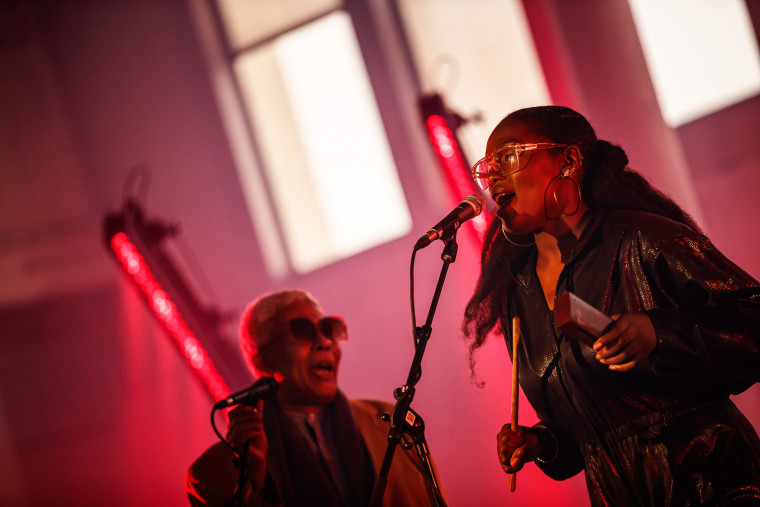
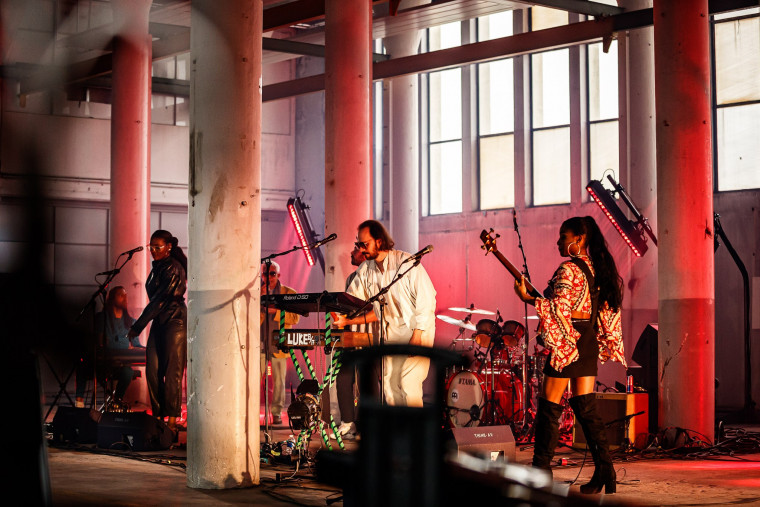
And how do you work together? What’s the process of composition like?
Arp Frique: I have a very intense way of working.
Mariseya: Arp can spend 24/7 in the studio.
Arp Frique: Yeah locked-in, tripping out in the zone. For me, music is two things: sound and emotion. I’m always looking for that blend. So, I start with the instrumental aspects, then we go to the vocals. And that differs from song to song. For example, with the track ‘Voyage’ the vocals were already there, and I asked Mariseya to dub it, making it wonderfully rich and big. Whereas on other songs that are coming up on the new album, it’s all Mariseya’s work and concepts.
Mariseya: Composing the vocals is like shaping the natural energy or flow. Arp sends over the music, usually with a little bit of guidance. There was always a shared feeling between Arp and me around what we want the message to be. Although his notes are quite general because I’m writing the lyrics in my own language of Twi, which he doesn’t speak. Like when I heard ‘Nyame Ye and Pa’ on our upcoming album, the song had this deep resonance. It’s incredibly spiritual and devotional. The lyrics came so easily from my experiences as a Christian and attending church. My mum double-checks my Twi, to make sure I get everything right. I speak the language fluently but, as I grew up in the Netherlands, it’s not perfect. The fact that I get to share a part of my identity with the world, and I really feel that people connect with the honesty of that, is so important. As a band, our process is organic, it’s not premeditated. There is no real ritual to what we do, we just go to the studio and see what happens.
Arp Frique: Well we have one ritual and that’s we talk for –
Mariseya: Hours!
Arp Frique: From personal to global, religious or political issues. Talking creates understanding, so you are on the same level. A way of knowing the world and each other. There is a strong sense of spirituality that links us all together, whether that’s Christianity or believing in a Creator of another kind.
Mariseya: It’s a very therapeutic process.
Arp Frique: Music is such a special thing because it facilitates communication, and it's deeply reciprocal: if you put something wonderful in, you get something equally amazing back. Making that personal connection is essential. There’s a reason why we call Arp Frique a family.
" Composing the vocals is like shaping the natural energy or flow. Arp sends over the music, usually with a little bit of guidance. There was always a shared feeling between Arp and me around what we want the message to be." - Mariseya
I hear that. Having watched you perform, there’s certainty a shared unity in your presence on stage.
Mariseya: For sure, Arp often says that we were meant to perform together as a band.
Arp Frique: Things happen for a reason – that’s my philosophy. I believe that certain people come into your life for a purpose.
Mariseya: I have a story that really speaks to that! One day, not long after I had joined the band, I was sitting in the car with our pianist Erik and we were talking about my dad who is a Ghanaian highlife musician. Erik was super excited and was like, “I love highlife, I used to be in highlife bands when I was younger. Who is your dad? Maybe I know him?” That kind of surprised me. In my mind, anyone who is involved in in the genre is West African or Ghanaian and Erik is Surinamese. So I told him my dad that is Nana Adomako Nyamekye. Turns out that him and Erik used to play together, more than twenty years ago, before I was even born. It was such a freaky coincidence that they knew each other. Apparently, my dad was a really big influence on Erik (who was only fourteen at the time) and introduced him to the highlife sound. I think it was fate. Last year, Dad came with us to Shambala Festival in England and he totally loved it. Of course, he was super happy and proud to see me perform with Erik.
That’s an incredible inter-generational musical inheritance. How did you end up becoming a musician? Was that through your dad too?
Mariseya: Actually, my dad wanted me to be a neurosurgeon or a nurse. But I ended up studying cultural social work and now I’m doing a project on Ghanaian youths in the Netherlands. My dad did put me into piano and singing classes, and we would sing together. It felt like a very natural progression though, not like something I was pressured into. I’ve always had a genuine and passionate interest in music.
"Music is such a special thing because it facilitates communication, and it's deeply reciprocal: if you put something wonderful in, you get something equally amazing back. Making that personal connection is essential. There’s a reason why we call Arp Frique a family." - Arp Frique
And you, Arp Frique? What was your journey into music?
Arp Frique: The way I got into music is also kind of through my parents. When I was about fifteen, I liked Nirvana, you know that song ‘Smells Like Teen Spirit’? My mum hated that song. When it came on the radio, she would immediately reach for the volume to shut it off. The fact that she intensely disliked it much just made me want to dive in deeper. From there, I was listening to bands like the Red Hot Chilli Peppers, and their collaboration with George Clinton led me to Funkadelic and Parliament. Then it was the synthesizer: jazz funk and Herbie Hancock. There’s so much that had inspired me, just to name a few: Stevie Wonder, Quincy Jones, William Onyeabor, especially what he does with synths. The rockers – Led Zeppelin and Jimi Hendrix. I even like country music.
Mariseya: You like country? Really?
Arp Frique: Absolutely! Leon Russell, for example, is incredible. His music is where country meets gospel and blues; so heartfelt and soulful.
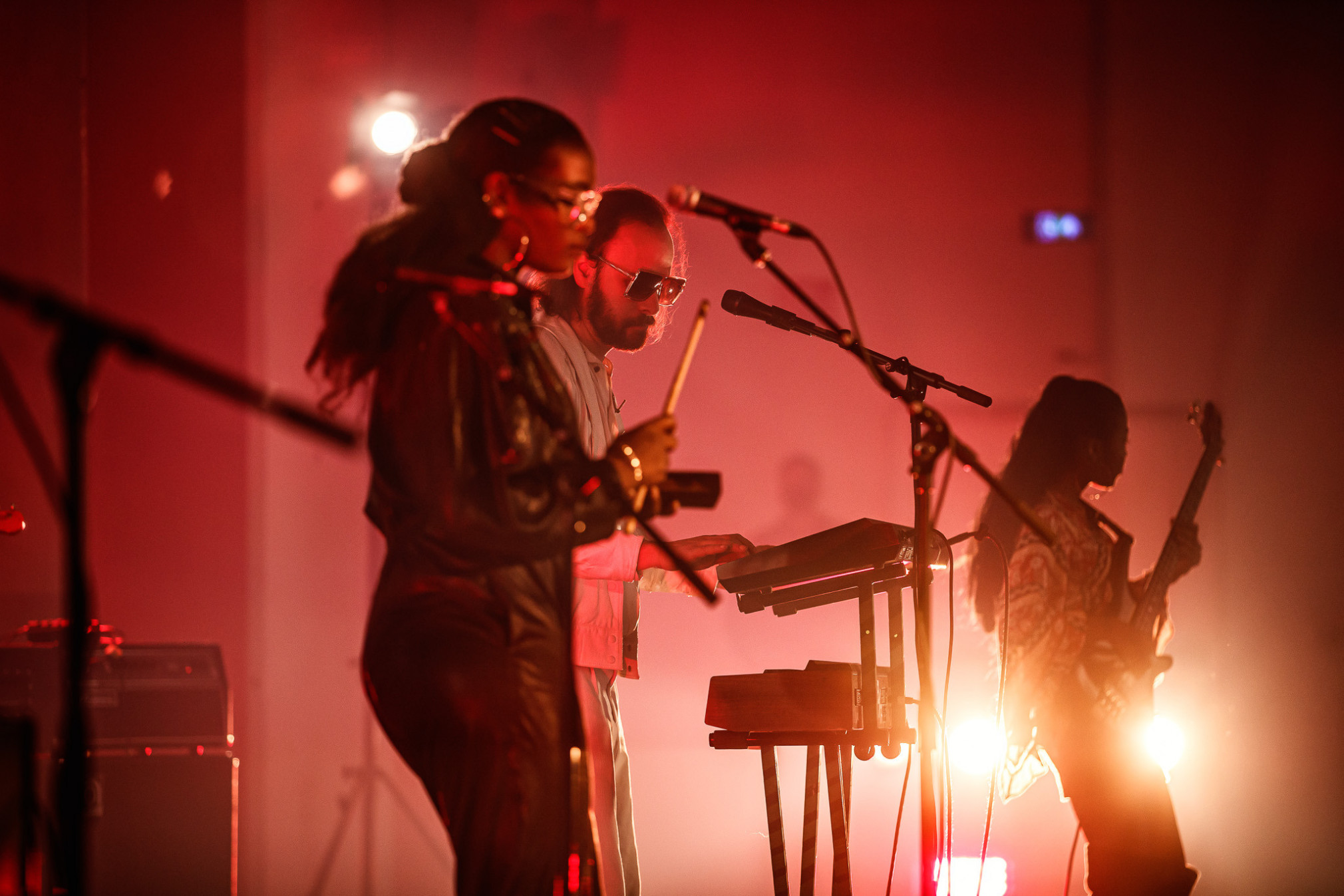
"Many people imagine Africa to be a unified country, without thinking considering the huge, complex diversity of the music, people and cultures." - Mariseya
Speaking of genres, there is so much going on in Arp Frique: from synth to afrobeat, highlife, reggae, funk and disco. The phrase ‘sonic tapestry’ comes to mind. How would you label it?
Mariseya: I don’t even know how I would describe it. Old school, energic, spiritual, supersonic – it just takes you to another dimension. What I find interesting about Arp as a musician is his ability to be able to put together all these different threads. Many people imagine Africa to be a unified country, without thinking considering the huge, complex diversity of the music, people and cultures. Arp can jump on the keyboard play out a tune that sounds so familiar, like something my Somalian neighbours would bump out. But, in the same song, he can also bring forward something distinctly West African too. I just want to applaud him for that; that he is able to respect and reflect the diversity of Africa.
Arp Frique: That means a lot, thank you! A label for Arp Frique is certainly difficult. When people ask, “What kind of music do you play?” I don’t have an answer. To me, its funk.
Mariseya: Funk and disco and reggae – all mixed.
Arp Frique: I think we’re going through a moment where genres and styles are being re-thought, and even done away with altogether. Labels can be reductive. The term “world music” has its own problematic history. It was invented by a group of British marketers in 1990s, who were having trouble selling records. Most people were familiar with reggae and Brazilian music at that time but, of course, there was so much more. It was decided that they would just put it into one big bin and call l it “world music.” Nowadays, I think we can all see why a Brazilian samba artist would take issue with being in the same category as a Bollywood band.
Your 2018 debut album, Welcome to the Colourful World of Arp Frique, featured the likes of Orlando Julius, Ed Motta and many other celebrated artists in the afrobeat, jazz, funk and soul canon. How did these collaborations come about?
Arp Frique: Before I began my solo career, I was mostly behind the scenes. I used to do a lot of bookings as a promoter for festivals and clubs, as well as working as a producer. Through a whole series of circumstances, this resulted in me coming into contact with Orlando Julius. I was extremely lucky to have such an amazing network of people, who I’ve known for so long and who I could reach out to. Ed Motta I’ve known for years, same with Ron – Ronald Snijders – who also appears on the album. Ron is a Dutch-Surinamese flute player. We’ve been friends for over two decades.
Mariseya: Aw, besties!
Arp Frique: Yeah, we are! It’s kind of strange because he’s in his 60’s. Perhaps he sees me a bit like one of his sons? Although we don’t have a relationship like that at all. We talk about all kinds of crazy stuff that would probably be off-limits with your kid haha.
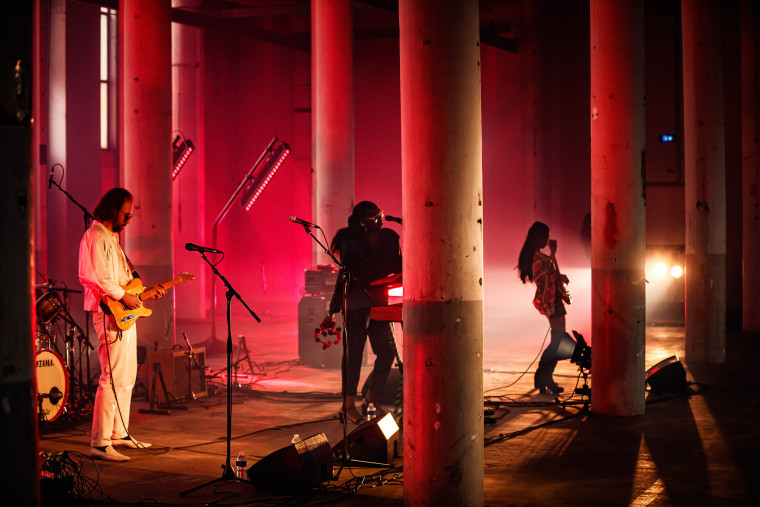
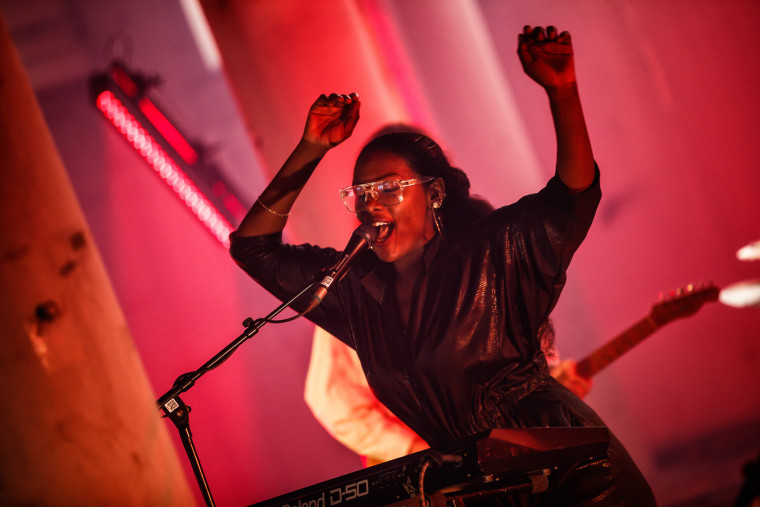
I feel that communication, and in a broader sense the idea of making meaning, is important to you. For instance, your stage names have a thought-out and unique origin. Can you tell me the backstory to “Arp Frique” and “Mariseya”?
Mariseya: My real name is Marissa, and my stage name of “Mariseya” comes from an amalgamation of my grandmother who is called Eno (that’s the Ghanaian name of my Dad’s mother), Yaa Achiaa (my maternal grandma) and Akosua (my mum).
Arp Frique: ARP was a synth company that began the US. Sadly, it went bust in the 1980s, but I have respect for the dude behind it. He was a pirate in the truest sense, styling elements from the Moog synth and incorporating them into his own designs. And the “frique” is a reference to one of the best songs of all time, ‘Le Freak’ by Chic.
Mariseya: You know, I thought that it was a play on Afrique, the French for Africa.
Arp Frique: That too! It’s three things – the ARP synth; ‘Le Freak’ and Africa. Although, that last one is a total coincidence because I didn’t realise the similarity to Afrique until later on.
Minina Bem Li, your latest EP, came out this October and it has such euphoric dance energy. Especially the track ‘Voyage,’ which evokes pure dancefloor nostalgia. How did you go about cultivating this vibe?
Arp Frique: The EP is released on Rush Hour records with Antal, who has been a longtime supporter of our work and a source of inspiration. As a dj, Antal has such an excellent insight into what works on a dancefloor and how to tailor that infectious party vibe. Finding what works is a delicate art. Discovering what will get people moving, I think, can never be a conscious decision. It occurs in the realm of the subconscious, as a feeling or a vibe. I love House, particularly Chicago House, and I was really interested in the way that the kick and the snare drum come together to make a rhythm. At the same time, Mariseya and Americo Brito bring their own distinct voices and heritage to the band. For the latest EP, we were listening to a lot of Zouk music, especially Kassav', and thinking about channelling the euphoria of Zouk.
"Discovering what will get people moving, I think, can never be a conscious decision. It occurs in the realm of the subconscious, as a feeling or a vibe." - Arp Frique
The 2012 Arp Frique album, Improvised Suites For Analog Machines was made in collaboration with Erik “Keysie” Ritfeld as a tribute to the most influential synthesizers of the 1970s and 80s. What is it exactly about the synth as an instrument that you love?
Mariseya: You should tell the myth of how synthesizers came to Cape Verde.
Arp Frique: Oh, this story is crazy. A couple of years ago there was this compilation of Cape Verdean music that pushed a narrative that synthesizers had come to the island via a cargo ship. According to the record label, the native people had never seen electronic equipment and began making beautiful music with the instruments. The story was picked up by the BBC, The New York Times, everyone fell for it. I have a lot of friends in Cape Verde and when I asked them, they were like, “Nah that’s bullshit.” If you think about it logically, it doesn’t make sense. It feeds into the idea that Africa is not in touch with the rest of the world; that it exists in some backwater where no technology exists. Which, of course, is not true.
But to answer your question about what I personally love about synthesisers, I started out with a guitar, but after about six or seven effect pedals, I found I couldn’t go any further. Synthesizers opened up a world of opportunities, and I know that I’m only at the beginning of the journey. Getting involved in synths is like travelling through time, especially with pre-set which only get better the further back you go. It was such pioneering technology at the time, so each newly produced synth has its own unique dysfunctions, and each of these errors creates new possibilities. I could go on and on and on, easily. As I said, I’m retro-obsessed.
Retro-vibes are extremely present in your aesthetic too. A non-music related question: your outfits are incredible. What’s your lucky item of clothing?
Arp Frique: I’m into onesies and boilersuits, which are practical for shows because you can just jump into them. My style icons are Nile Rodgers and Bernard Edwards for sure – the smart, stylish way they dressed in the 70s.
Mariseya: And for me – shades. I had these funky shades that were so cool. Wearing them, I felt like the ultimate rockstar. Then they broke somewhere along the way, which was super sad. I lost my lucky charm!
